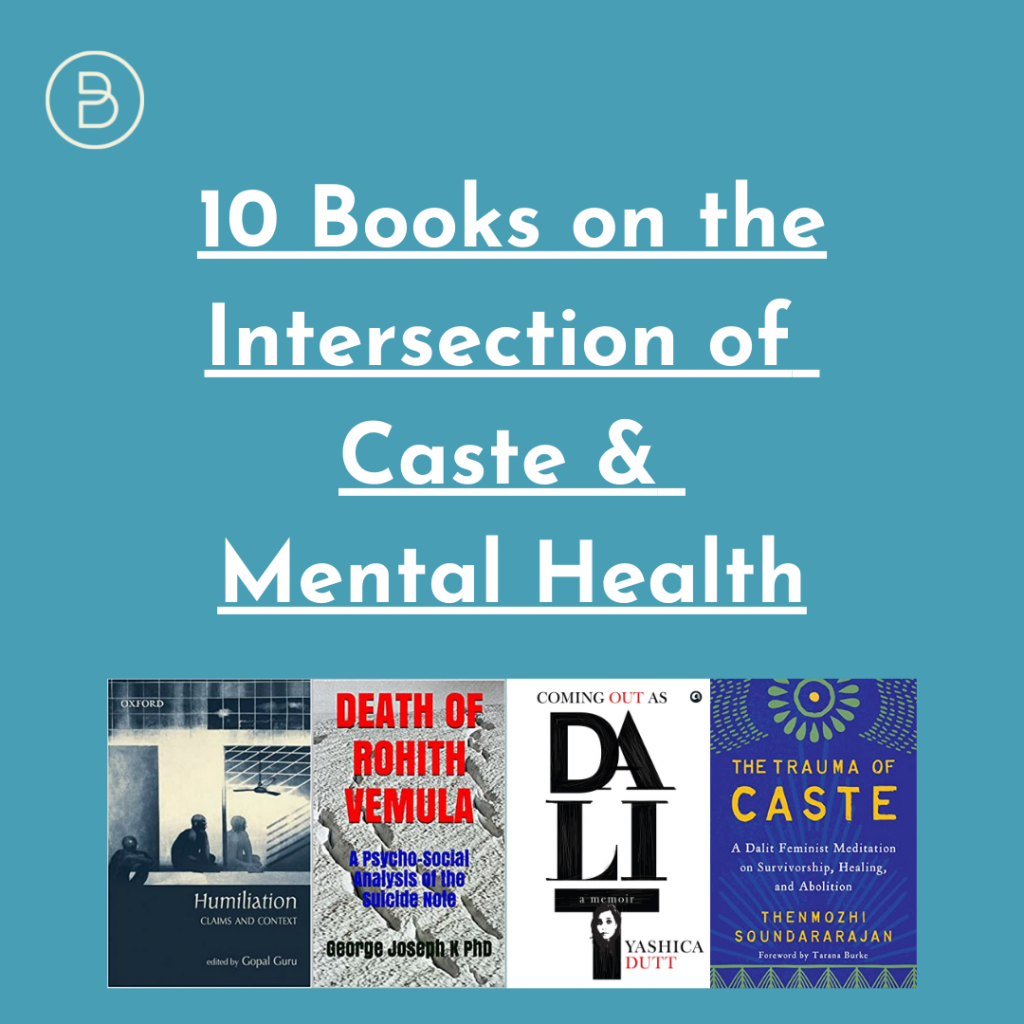Dalit persons experience discrediting, stigmatization, rejection, various forms of segregation and access denial, exclusion, physical violence and emotional abuse on a daily basis. The state-supported structural oppression has made it quite difficult for the victims of the caste system to mitigate mental health issues.
Additionally even though there are now quite many resources to understand caste and its all pervasive nature in India, there are relatively fewer resources to study the impact of caste and mental health and vice versa. According to a research conducted in 2015, “discrimination linked to caste in accessing education or employment has been a leitmotif in modern India and only partially addressed through constitutional provisions and reservation policies. Exclusion from employment linked to negative attitudes and lack of income are the highest contributors to multidimensional poverty, increasing the mental health burden for the family.”
While most of the resources on mental health have been plagued with upper caste and class gaze, there are a few books which throw light on the intersection of caste and mental health. This mix of books try to sensitively question the gaze and at the same time offer a much-needed insight into the multilayered impact of caste on mental health and wellbeing.
We recommend you read the blurb and trigger warnings for each book before picking it up.
- Coming out as Dalit by Yashica Dutt
In this personal memoir that is also a narrative of the Dalits, Yashica writes about the journey of coming to terms with her identity and takes us through the history of the Dalit movement; the consequences of her community’s lack of access to education and culture; the need for reservation; the paucity of Dalit voices in mainstream media; Dalit women’s movements and their ongoing contributions; and attempts to answer crucial questions about caste and privilege.
Source: http://www.alephbookcompany.com/book/coming-out-as-dalit/
2. Death of Rohit Vemula: A Psycho-Social Analysis of the Suicide Note by George Joseph
The book deals with the historical background of the caste instigated forced suicide of the PhD student of the Hyderabad Central University India. It gives psycho-social analysis of the suicide note left by Rohith Vemula and exposes the horror of the caste system and the intellectual inadequacies of the movements he was associated with.
Source: https://www.goodreads.com/book/show/33907370-death-of-rohith-vemula
3. Experience, Caste, and the Everyday Social by Gopal Guru and Sundar Sarukkai
A continuation of authors’ work Cracked Mirror, this book is a theoretical interpretation of the process of the creation of the ‘social’ through our everyday lives-of how we construct a sense of ‘identity’, ‘authority’, and ‘ethics’ through sensory perceptions that we experience in our daily lives.
Source:https://global.oup.com/academic/product/experience-caste-and-the-everyday-social-9780199496051
4. Humiliation: Claims and Context by Gopal Guru
Often regarded as a pioneering work in the field of political and moral theory, this text by Gopal Guru explores the complex and varied meanings, contexts, forms, and languages of humiliation within an interdisciplinary framework.
Source: https://global.oup.com/academic/product/humiliation-9780198074922
5. Interruptions in Identity by Ambika Singh
The work turns a psychosocial lens and further elaborates on how suicidality expresses itself in the space between the subject and the therapist within the safe space of a clinic. In taking us through these narratives, the author builds a case that it is important to reflect not just on the nature of individual suffering but also its interaction with the prevalent and relevant socio-political forces.
Source: https://in.sagepub.com/en-in/sas/interruptions-in-identity/book280029
6. Karukku by Bama
The first autobiography by a Dalit woman writer and a classic of subaltern writing, it is a bold and poignant tale of life outside mainstream Indian thought and function. Revolving around the main theme of caste oppression within the Catholic Church, it portrays the tension between the self and the community, and presents Bama’s life as a process of self-reflection and recovery from social and institutional betrayal.
Source: https://global.oup.com/academic/product/karukku-9780199450411?lang=en&cc=dk
7. The Buddha and His Dhamma – A Critical Edition by B. R. Ambedkar
The Buddha and His Dhamma was B.R. Ambedkar’s last work. Published posthumously, it presented a radical reorientation of Buddhist thought and literature, aptly called navayana. It deals with Ambedkar’s conceptualization of Buddhism and the possibilities it offered for liberation and upliftment of the Dalits.
Source: http://www.columbia.edu/itc/mealac/pritchett/00ambedkar/ambedkar_buddha/
8. The Cracked Mirror: An Indian Debate on Experience and Theory
Using a dialogic form and placing the reality of untouchability and Dalit life at the centre of analyses, Gopal Guru and Sundar Sarukkai examine the ontological and epistemological nature of experience, thereby exhibiting the politics of experience. By illustrating ways of using alternative frameworks for theorising, The Cracked Mirror argues for a more careful understanding of the ethics of representation.
Source: https://india.oup.com/product/the-cracked-mirror-9780199474592
9. The Prisons We Broke by Baby Kamble, Translated from the Marathi by Maya Pandit
Writing on the lives of the Mahars of Maharashtra, Baby Kamble reclaims memory to locate Mahar society before the impact of Babasaheb Ambedkar, and tells a powerful tale of redemption wrought by a fiery brand of individual and collective self-awareness.
Source: https://orientblackswan.com/details?id=9789352873708
10. The Trauma of Caste: A Dalit Feminist Meditation on Survivorship, Healing, and Abolition by Thenmozhi Soundararajan
Dalit American activist Thenmozhi Soundararajan puts forth a call to awaken and act, not just for readers in South Asia, but all around the world. She ties Dalit oppression to fights for liberation among Black, Indigenous, Latinx, femme, and Queer communities, examining caste from a feminist, abolitionist, and Dalit Buddhist perspective–and laying bare the grief, trauma, rage, and stolen futures enacted by Brahminical social structures on the caste-oppressed.
Source: https://www.northatlanticbooks.com/shop/the-trauma-of-caste/


No Comments
Leave a comment CancelComments are closed.